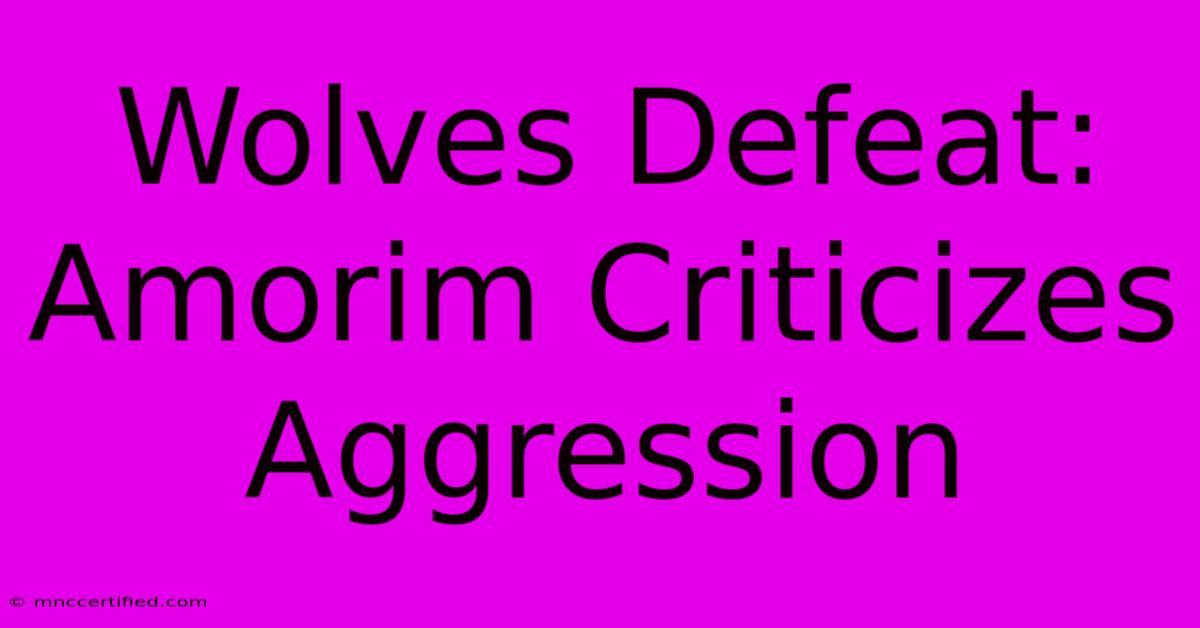Wolves Defeat: Amorim Criticizes Aggression

Table of Contents
Wolves Defeat: Amorim Criticizes Aggression
Sporting CP's disappointing defeat against Wolves in the Europa League has sparked strong reactions, with manager Rúben Amorim heavily criticizing the aggressive tactics employed by the opposition. The match, characterized by physical play and controversial decisions, left Sporting CP with a significant uphill battle in the competition. This article delves into Amorim's post-match comments, analyzes the key incidents, and explores the implications for Sporting CP's remaining Europa League campaign.
Amorim's Post-Match Outburst: More Than Just a Loss
Following the defeat, Amorim didn't mince words. He expressed his discontent with the refereeing, highlighting what he perceived as a lack of control over Wolves' aggressive challenges. His criticism went beyond individual incidents, pointing to a broader pattern of physical play that, in his view, disrupted the flow of the game and unfairly impacted Sporting CP's performance. He specifically mentioned several tackles that he felt should have resulted in cards, arguing that the referee's leniency emboldened Wolves to maintain their aggressive approach. The manager's frustration was palpable, reflecting not just the disappointment of losing, but also a belief that the game was played under unequal conditions.
Key Incidents Fueling the Controversy
Several key incidents during the match fueled Amorim's post-match anger. One particular challenge on [Insert Player's Name], a key player for Sporting CP, went unpunished despite appearing to be a reckless foul. This incident, along with several others involving strong tackles and late challenges, contributed to the perception of a biased officiating. The lack of cards for Wolves, contrasted with potentially stricter calls against Sporting CP, further amplified Amorim's frustration. Analyzing these incidents frame-by-frame could potentially reveal a case for a more decisive refereeing performance. The absence of VAR in this particular Europa League match also contributed to the controversy.
The Tactical Implications and Sporting CP's Future
Amorim's criticism extends beyond mere refereeing complaints. It suggests a tactical analysis of Wolves' game plan, suggesting that the aggression was not accidental but a deliberate strategy. This raises questions about how Sporting CP can counter such approaches in future matches. The defeat highlights the need for Sporting CP to adapt their tactics to better handle physical, aggressive opponents. Perhaps incorporating more robust defensive strategies or adjusting their playing style to minimize exposure to these challenges will be key moving forward.
The defeat puts significant pressure on Sporting CP's remaining Europa League campaign. They'll need to significantly improve their performance and potentially overcome a deficit to progress. Amorim's post-match comments serve as a call to arms, signaling a need for both improved performance on the pitch and a more effective approach to managing the challenges presented by physical opponents.
The Importance of Fair Play and Refereeing Consistency
Beyond the immediate repercussions for Sporting CP, the controversy underscores the ongoing debate surrounding fair play and consistency in refereeing. Amorim’s comments raise important questions about the balance between physicality and foul play in football. The incident highlights the need for referees to apply the laws of the game consistently, regardless of the teams involved, to ensure fair competition and maintain the integrity of the sport. This isn't just about Sporting CP; it's about upholding the standards of professional football.
Conclusion: Looking Ahead for Sporting CP
Sporting CP's defeat against Wolves, and Amorim’s subsequent criticism, have provided a crucial focal point for analysis. The match wasn't just a loss; it serves as a case study in tackling aggressive tactics, refereeing consistency, and adapting to the challenges presented by differing playing styles in high-stakes European competition. How Sporting CP responds to this setback will determine their future in the Europa League and highlight the team’s resilience and adaptability. The focus now shifts to the next matches – can they overcome this obstacle, learning from the criticisms and turning the tide? Only time will tell.

Thank you for visiting our website wich cover about Wolves Defeat: Amorim Criticizes Aggression. We hope the information provided has been useful to you. Feel free to contact us if you have any questions or need further assistance. See you next time and dont miss to bookmark.
Featured Posts
-
Seahawks Ir Walker Iii Sign Replacement
Dec 27, 2024
-
Manmohan Singh 92 Former Indian Prime Minister Dies
Dec 27, 2024
-
Fernandes Red Cunha And Hwang Secure Win
Dec 27, 2024
-
Celtic 4 0 Motherwell Engels Masterclass
Dec 27, 2024
-
Man City Everton Live Premier League Score
Dec 27, 2024